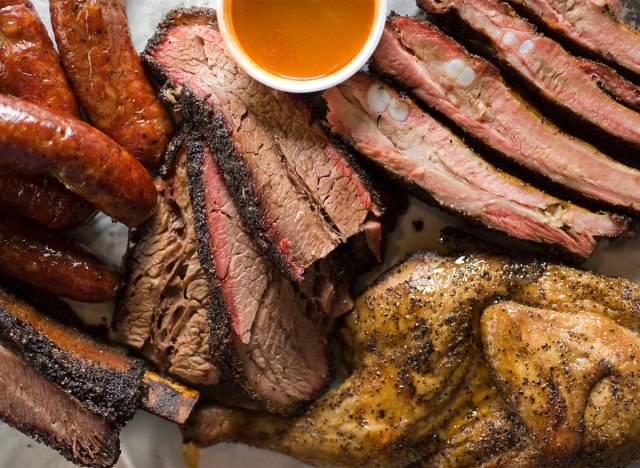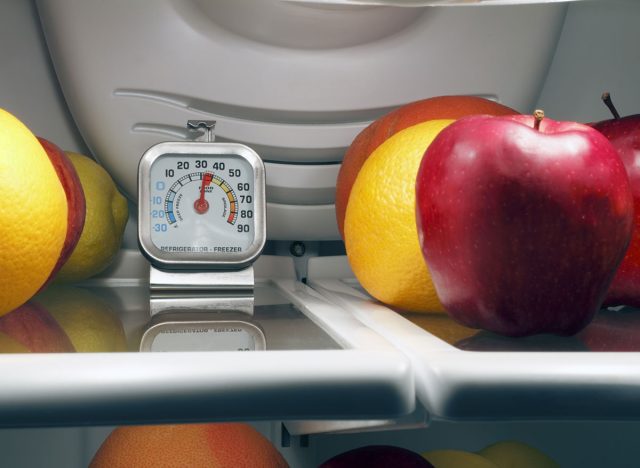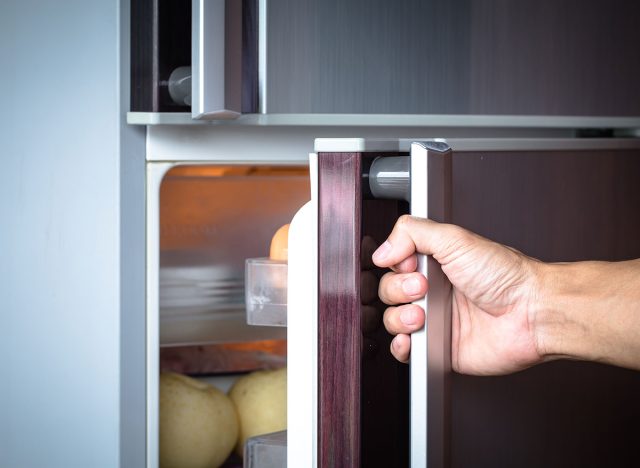Meat lovers know that meat can be a pricey purchase. In fact, the cost of meat, poultry, and fish all rose nearly 12 percent last year, according to the U.S. Consumer Price Index. Fortunately, most cooked meats can be stored as leftovers and transformed into a number of new meals, from comforting casseroles to hearty soups—but that's only if they're stored safely. According to the Centers for Disease Control and Prevention (CDC), in order for meat in your fridge to be safe to consume, you have to make sure to put it away properly. Read on to find out what you should always do first before putting meat in your refrigerator.
You should never store meat in your fridge without cutting it up first.

If you're looking to throw your leftover meat in your fridge, don't just stick it in there without a second thought. According to the CDC, you should never refrigerate cooked meat that has not been pared down already. "Large cuts of meat, such as roasts or a whole turkey, should be divided into small quantities for refrigeration," the agency warns.
Leftovers need to be refrigerated at a specific temperature.

According to the CDC, leftovers should be stored in the refrigerator at a temperature of 40 degrees Fahrenheit or colder within two hours of being cooked. If the food has been exposed to temperatures that are hotter than 90 degrees Fahrenheit—like in a hot car or at a summer picnic—it should be put in the fridge within one hour, however.
This is to prevent the growth of bacteria from reaching these foods. But in order for large cuts of meat to cool quickly enough to halt this evolution, they "should be divided into small quantities" first, per the CDC.
Eating food that has grown bacteria can put you at risk of severe illness.

E. coli and Salmonella are two common types of bacteria that can be found in meat, according to the CDC. If someone has eaten food that is contaminated with either bacteria, they can develop food poisoning. E. coli can cause severe illness such as diarrhea, urinary tract infections, respiratory illness, and bloodstream infections, while Salmonella can result in a common foodborne illness that affects more than one million people in the U.S. every year, per the agency.
For both bacteria, certain groups of people are more at risk for developing severe or fatal illness. According to the CDC, children who are younger than 5 years old, adults who are 65 years old or older, people whose immune systems are weakened, and pregnant women all have a higher risk.
"Contact your healthcare provider if you have diarrhea or vomiting that lasts for more than 2 days, bloody stools, a fever higher than 102 degrees Fahrenheit, or signs of dehydration (including little or no urination, excessive thirst, a very dry mouth, dizziness or lightheadedness, or very dark urine)," the CDC warns.
Cooked meat can't be stored in the fridge forever.

Don't keep your cooked meat in the fridge for too long and expect it to still be safe to eat. Even the most properly stored meats won't stay good for an infinite amount of time, according to the U.S. Department of Agriculture (USDA). But the shelf life for these cooked foods varies by type. The USDA says that cooked bacon or sausage can last safely in a fridge that is 40 degrees Fahrenheit or cooler for one week. Other cooked meat or poultry will only stay good for three to four days in the fridge.
"The short time limits for home-refrigerated foods will help keep them from spoiling or becoming dangerous to eat," the agency explains.
No comments:
Post a Comment